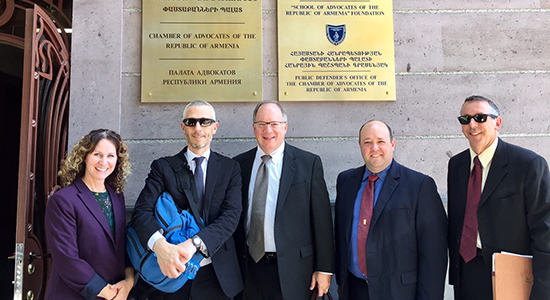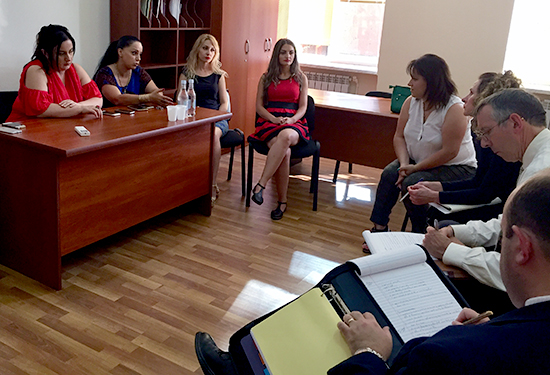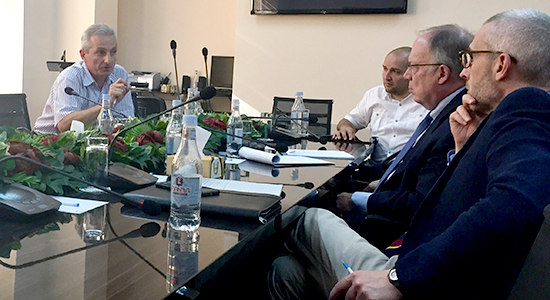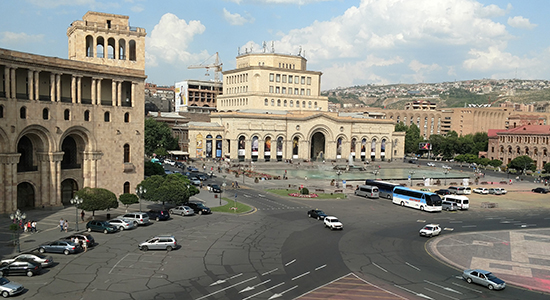
In front of the Armenian Chamber of Advocates building in Yerevan, from left: Gina Pruski, SPD training and development director; Tim Pierce, State Bar ethics counsel; George Brown, State Bar former executive director; Adam Plotkin, SPD Legislative Liaison; and Deputy State Public Defender Michael Tobin.
Sept. 6, 2017 – When the U.S. State Department calls, you answer.
In July, five Wisconsin legal professionals traveled 6,000 miles to begin a partnership that will help refine and enhance the justice system in the Republic of Armenia.
At the invitation of the U.S. Department of State’s Bureau of International Narcotics & Law Enforcement Affairs (INL), State Bar of Wisconsin former Executive Director George Brown and Tim Pierce, State Bar ethics counsel, traveled to Armenia last month along with representatives from the Wisconsin State Public Defender’s Office (SPD) to lend their expertise in hopes of strengthening Armenia’s justice system.
The State Bar of Wisconsin partnered with INL to help Armenia’s Chamber of Advocates (the equivalent of the State Bar combined with the Office of Lawyer Regulation and a specialized law school for defense attorneys and public defenders) and its Public Defender Office provide more accountable, transparent, and equitable justice services to the public. Such efforts help combat criminal threats that are increasingly transnational and unbound by traditional borders.
“They are looking for ways to improve their operations,” Brown said. INL invited the State Bar to participate in the trip because of the depth of its resources and the services it provides to its members.
“This is obviously an honor for the State Bar, and an indication of the quality we bring,” Brown said.
A New Way of Doing Things
The journey, funded by the State Department, took the Wisconsinites to the Armenian capital of Yerevan. There they met with members of the Armenian Chamber of Advocates and Public Defender Office, and with staff from the Armenian Ministry of Justice, the Prosecutor General’s Office, and the Special Investigative Service – the organization that investigates crimes involving government officials.
Shannon Green is communications writer for the State Bar of Wisconsin, Madison. She can be reached by email or by phone at (608) 250-6135.
In the coming months, the work really begins – they will return to Armenia to work closely with the staff of the Armenian Chamber of Advocates.
“I was impressed with their desire to improve operations,” Brown said, including making their ethics code more enforceable and improving continuing education programs. “They have a lot of good things in place, but are looking to make it even better.”
However, “Corruption is still a problem for the general public,” Pierce said.
Chamber members understand the importance of learning to effectively regulate themselves, to have an effective system of discipline and ethics, Pierce said.
The Armenians are also seeking to improve their continuing legal education offerings. “Much of their education is theoretical, with little that’s practical,” said Brown. And they hope to help them educate the public on what to expect from a lawyer.
The staff of the Chamber of Advocates is also seeking to create a more effective disciplinary system for advocates, said Pierce. Currently, advocates can draw out the disciplinary process for years.

Wisconsin State Public Defender staff (right) listen to their counterparts from the Armenian Public Defender’s Office at a meeting in July in Yerevan, Republic of Armenia.
Similar Issues — Half a World Apart
Armenia’s public defender system, started in 2007, includes representation in both criminal and civil cases for those who are eligible.
Through INL, Chamber staff members requested to work with U.S. experts to improve their operations. In response, Wisconsin’s SPD sent three staff with diverse and experienced backgrounds: Michael Tobin, deputy state public defender; Adam Plotkin, legislative liaison; and Gina Pruski, training and development director.
“What an incredible opportunity for our agency to be involved in something like this,” Pruski said.
Tobin, Plotkin, and Pruski studied the Armenian system, structure, caseloads, and other operations. “Like public defenders everywhere, they are underfunded and understaffed, and high caseloads are an issue,” Tobin said.
“Once you get past the differences between our systems, we realized that we have the same basic concerns and issues – even 6,000 miles apart,” said Plotkin. The question from the Armenians was how they can be a better agency – one that’s efficient, that provides quality services.
“The advocates are very enthusiastic and dedicated to their clients,” Tobin said. “Meeting with them was one of the most energizing and inspiring parts of the trip.”
They met with managers and staff, who reminded the Wisconsinites of their colleagues back home. “They have so much passion, they care about the people they serve, and are very hard working,” Pruski said.
Differences between the Wisconsin and Armenian system include the fact that Armenia has equal pay for public defender attorneys and prosecutors, and that their public defenders also handle civil cases.
“That’s very different from our system. A huge part of their case load is civil work,” Pruski said.

At right, State Bar of Wisconsin ethics counsel Tim Pierce, former Executive Director George Brown, and SPD Legislative Liaison Adam Plotkin speak with a board member of the Armenian Chamber of Advocates.
Busy Nights, Hot Days
Physically, the trip was exhausting, Brown said, not only because of the travel distance, but also because of the altitude of Armenia (about 4,000 feet above sea level — much higher than Wisconsin's), and its climate: very hot and dry, with temperatures reaching into the low 100s Fahrenheit.
Yerevan is a modern European city of about 1.2 million people. It reminds Brown of Athens – with streets crowded with adults and children as late as 11 p.m. each night, and nightly concerts in front of the National Museum of Art near their hotel.
“It is a very beautiful country, and the people are wonderful,” Brown said.

A downtown square in Yerevan, Armenia, includes the History Museum of Armenia, center, founded in 1919.
Plans for the Future
The next step for the Wisconsin consultants is to identify issues in the Armenian system and provide recommendations for improvements. A follow-up trip is in the works to engage in this substantive, collaborative work.
“This experience was exhilarating and exhausting,” Pruski said. “We are absolutely excited to go back again."
Advocates in Armenia: Defense Attorneys and Civil Lawyers
Armenia follows a European model for their justice system: lawyers (who handle contracts and transactional work) hold undergraduate degrees in law; advocates (defense attorneys and public defenders), prosecutors, and judges receive additional — and separate — specialized training. Judges are not elected, but appointed.
The Chamber of Advocates is an independent, professional, and self-governed organization that supports advocates. It is a combination equivalent of the State Bar of Wisconsin, the Office of Lawyer Regulation, and a specialized law school for those seeking to become advocates.
Advocates – who also handle civil cases – hold a specialized license to practice as an advocate. They must be members of the Chamber of Advocates. Membership requires an undergraduate law degree, specialized training as an advocate, a minimum of five years’ work in the legal field, and passing a qualifying (bar) exam. As of July 2017, there are 1,851 advocates in Armenia, with 42 percent of them women.
